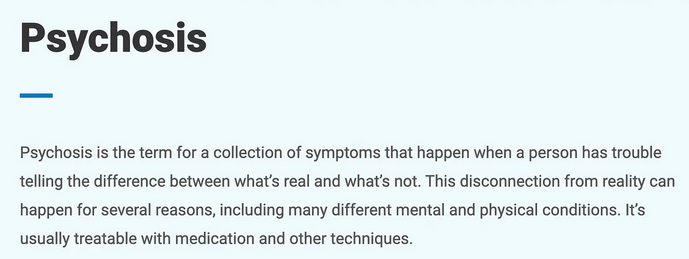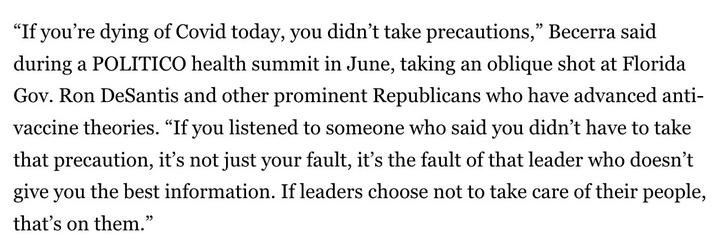But what this whole developing scandal really reminded us of was, ironically, another scientific paper that was published in the midst of the pandemic. This one in the Journal of Experimental Social Psychology was released in September 2021 and titled: “Misplaced trust: When trust in science fosters belief in pseudoscience and the benefits of critical evaluation”.
The paper consisted of the results of four pre-registered experiments of decent sample size, albeit administered online. They introduced false claims about a fictional virus created as a bioweapon, and about the carcinogenic nature of GMO foods.
The results were so, so very telling.
“Participants who trust science are more likely to believe and disseminate false claims that contain scientific references than false claims that do not,” and “We conclude that trust in science, although desirable in many ways, makes people vulnerable to pseudoscience.”
Let that sink in. The people who #BelieveScience are more vulnerable to falling for pseudoscientific claims, especially when those claims are presented with the comforting ephemera of science — the lab coats, the credentials, the technical studies filled with jargon. That’s because “Believing Science” isn’t the same thing as actually doing science. “Believing Science” is a statement of tribal affiliation. All this claim demonstrates is that a person wants to be seen as the sort of individual who believes experts and takes advice from trusted and credentialed officials. For the most part, this is a good instinct! But if those experts and trusted officials are wrong, malicious, or simply full of shit, the “Believe Science” crowd will reliably fall in line. Because of its ideological affiliation, this crowd is, ironically, far less capable of spotting bad science.
Actually doing science as opposed to merely believing in it requires that we all evaluate claims critically regardless of their origins; we look for inconsistencies, we examine the quality of the evidence presented, and we question the credibility of the people making the claims.
“Dispatch from the Front Line: Comms aren’t the government’s problem”, The Line, 2023-07-23.
October 27, 2023
October 26, 2023
October 24, 2023
What is a man?
Rob Henderson recently gave a lecture at the University of Richmond as part of their “Masculinity in a Changing World” series. Part of the lecture involved exploring the question “what is a man?”
Of course, there are many ways of understanding what being man is about, and there are many valid ways to be a man. However, regardless of how it is expressed, it usually has something to do with strength and toughness and productivity.
In his cross-cultural research, the psychologist Martin J. Seager has found 3 consistent requirements to achieve the status of manhood in various societies around the world.
First, the individual must be a fighter and a winner.
Second, he must be a provider and protector.
And third, he must maintain mastery and control of himself at all times.
Across cultures, there seems to be an implicit understanding of what being a man is.
Indeed, in a widely-cited study of 25 cultures—including New Zealand, Finland, Zimbabwe, Malaysia, Pakistan, Bolivia, and Trinidad—definitions of masculinity and femininity hardly fluctuated at all. As a rule, participants in this study said they did not believe that men and women differed in all respects, and they did not view one sex as inherently superior to the other. But in every culture, men were seen as active, adventurous, dominant, forceful, independent, and strong.
Contemporary polemicists will rhetorically ask questions like, “What is a woman?” But seldom does anyone ask, “What is a man?” People seem to already know.
Indeed, many individuals resort to commonplace expressions such as, “Man up”, or “Be a man”, or, more crassly, “Grow some balls”. In polite society, people won’t publicly express such remarks, but many will still think them.
Men, of course, are responsive to these statements. In a famous literary illustration, Shakespeare’s Lady MacBeth reinforces the conception of manhood as strength. Early on in this 17th century play, she receives a letter from her husband. The letter details an encounter with 3 witches and their prophecy that her husband Macbeth will take over the throne from King Duncan.
Lady Macbeth is eager for this power and insists that she and her husband must murder the King themselves in order for this prophecy to come true. Lady Macbeth expresses her concerns however, when she grows worried about whether her husband will be manly enough to follow through with this agreement. Her fears are confirmed when Macbeth, upon reflecting on the consequences of treason, subsequently backs out of the plan.
Lady Macbeth then persuades her husband when she proclaims that if he were to go through with the murder, then he would not only be a man, but “so much more.”
By dangling the enticing reputation of manliness over her husband, Lady Macbeth succeeds in getting him to kill the king, and subsequently setting in motion the chaotic events of the rest of the story.
Shakespeare was clearly a keen observer of human nature in general and of men’s anxieties about their masculinity in particular.
Such anxieties regarding the belief that manhood is something that must be achieved through action appear to be ubiquitous around the world.
I’ll offer a few brief examples.
On the Greek Aegean island of Kalymnos, many of the inhabitants make their living by commercial sponge fishing. The men dive into deep water without the aid of special equipment, which they scorn. Diving is a gamble because many men are stricken and injured. Young divers who take precautions are mocked as effeminate and ridiculed by their peers.
Halfway around the world, in the high mountains of Melanesia, young boys undergo intense trials before achieving the status of manhood. Young boys are torn from their mothers and forced to undergo a series of brutal masculinizing rituals. These include whippings, beatings, and other forms of terror from older men, which the boys must endure stoically and silently. This community believes that without such hazing, boys will never mature into men but remain weak and childlike. Real men are made, they insist, not born.
To this extent, the psychologist Roy Baumeister has pointed out that, “in many societies, any girl who grows up automatically becomes a woman … Meanwhile, a boy does not automatically become a man, and instead is often required to prove himself, usually by passing stringent tests or producing more than he consumes.”
In many non-industrialized small-scale societies, girls are believed to become women when they are physically able to produce children. The ability to have kids is considered a major contribution in itself to the community. Boys, in contrast, do not have a clear and visible biological indicator of manhood, and must often endure culturally sanctioned rituals and painful trials to become men.
Indeed, masculinity is widely considered to be an artificially induced status, achievable only through testing and careful instruction. Real men do not simply emerge like butterflies from their boyish cocoons. Rather, they must be carefully shaped, nurtured, counseled, and prodded into manhood.
The literary critic Alfred Habegger has remarked that masculinity “has an uncertain and ambiguous status. It is something to be acquired through a struggle, a painful initiation, or a long and sometimes humiliating apprenticeship.”
October 22, 2023
A lawyer in “deep blue” Pennsylvania discovers that elected bodies don’t have to listen to the voters
Chris Bray on the details of a case from Pennsylvania where an active and involved parent tried to get answers from the elected school board on how they justified imposing masking requirements without a shred of legal power to do so:
In December of 2021, the Pennsylvania Supreme Court ruled that officials in that state had implemented mask mandates that they had no legal authority to impose. The decision in Corman v. Beam is not written in stirring language, and makes no bold declarations about truth, freedom, and the American way; it’s a workmanlike examination of statutory language, quite dull to read. Test me on that characterization, if you want. But the court concluded, importantly, that the mandate had been invalid ab initio — not from the moment the court struck it down, but rather from the moment it was issued. Mask mandates had never been enforceable in Pennsylvania.
In an affluent, deep blue community in the Philadelphia suburbs, a lawyer and parent named Chad Williams took the ruling as vindication. With four children in the local schools, he’d been telling school officials — clearly and often — that they had no legal authority to require masks on campus. To say that they hadn’t listened would be an understatement.
In August of 2020, during a Zoom meeting to decide on in-person school for the soon-to-begin school year, the nine-member Unionville-Chadds Ford school board muted Williams when he asked about the legal basis for the choice.
Repeating the performance, school board members cut the microphones and walked out of one of their own subsequent meetings, in August of 2021, to avoid listening to Williams when he didn’t stop speaking at the three-minute mark during their public comment session. Other parents concerned about forced masking for children received a similarly warm reception. The school board voted unanimously that same night to again impose a mask mandate on their campuses for the new school year.
For Williams, the repeated experience was a shock. He was an experienced lawyer, a parent, an established member of the community, and a volunteer coach at the high school — and he couldn’t get anyone to listen to a reasonable question. He asked his school board to explain the legal basis for a new policy, and “the school board president just cut me off.” Officials were acting in lockstep, without apparent authority, and refusing to explain their choices. “They just wouldn’t answer,” Williams says. Many of us have had this experience.
The school district finally dropped its mask mandate in March of 2022, after the decision from the state Supreme Court. And that was the end — except for one thing. A formal policy of the Unionville-Chadds Ford School District, Policy 906, establishes “a fair and impartial method” for the examination of parent complaints. You can find that policy here, in the section labeled “Community”. The policy is detailed and unambiguous, and starts requiring written reports after the failure of early and informal stages of resolution:
Third Level – If a satisfactory solution is not achieved by discussion with the building principal or immediate supervisor, a conference shall be scheduled with the Superintendent or designee. The principal or supervisor shall provide to the Superintendent or designee a report that includes the specific nature of the complaint, brief statement of relevant facts, how the complainant has been affected adversely, the action requested, and the reasons why such action should be taken or not taken.
Fourth Level – Should the matter not be resolved by the Superintendent or designee or is beyond his/her authority and requires Board action, the Superintendent or designee shall provide the Board with a complete report.
Final Level – After reviewing all information relative to the complaint, the Board shall provide the complainant with its written decision and may grant a hearing before the Board or a committee of the Board.
Williams used Policy 906 to ask the school board to think about what it had done, conducting an independent review of its policy decisions during the pandemic. Why had school officials implemented policies they had no legal authority to impose? Why had they refused to discuss or address parent questions? Why had they stonewalled requests for documents and information — not only from parents, but from a state senator who took an interest in the matter? Williams asked for an apology and “changes in oversight” to prevent a recurrence of unlawful and unexplained policy decisions, using formal school district policy that requires the district to act on complaints.
They haven’t bothered. The Unionville-Chadds Ford School District continues to ignore Williams, not responding to his complaints or opening the inquiry their own policy requires them to pursue. He’s had one sort-of response: In an exchange over the handling of the complaint, the district’s lawyers, at a private law firm, threatened him with legal action — a threat they so far haven’t made good. But from school district officials, the only response to three years of questions is unbroken silence.
October 18, 2023
October 17, 2023
QotD: Representations of sex work in SF
Whether they were “Socialators” in Battlestar Galactica, or “Companions” in Firefly, or any number of other euphemisms, one SF trope that seems particularly insidious, especially in movies and TV, more-so than in literature, although it is still prominent there, is turning the world’s oldest profession into something glamorous and honorable, even exalted. I recently had the misfortune to read a book where they took “Make Love, Not War” literally, and all women were drafted at 18 to serve a couple years in a sex corps to keep the peace, under the idea that a free and easy sexual outlet was all it took to quell man’s violent nature. (This was only a background element, not the main focus of the story, but on the other hand, the primary plot about laser light shows being the most highly regarded form of art wasn’t particularly compelling either. And don’t get me started on how unlikable the characters were.)
Maybe it’s a relic from when SF was just another facet of Men’s Adventure magazines, or maybe it’s capitalizing on the stereotypical basement-dwelling Geek’s desire to have high quality women to command at the wave of a few credits or gold pieces. Or, more cynically, it’s the desire of Hollywood producers who actually DO have high quality women at their mercy, career-wise, to further normalize the idea that “Sex work is real work” to help smooth away the resistance to their hamfisted efforts on the casting couch.
TV Tropes has a number of entries about this, from “Unproblematic Prostitution” to “High Class Call Girl”. Writers like to call up the imagery of the Geisha, and make their Space Hookers come across as brilliant sexual artists, with additional talents that help the protagonists, such as advanced degrees or connections to corporate executives and high ranking government officials. (Funny how they are not corporate movers and shakers or government officials themselves …). They forget, of course, that Geisha were not actually prostitutes, and only rarely took lovers. There were still actual brothels in Japan for that sort of thing.
Science Fiction has gotten a lot more difficult to write as the frontiers of reality have pushed back against the flights of fantasy. We have had to accept that you can’t get to the moon inside a Victorian upholstered artillery shell, or set foot on the Jungles of Venus. And maybe that’s why a lot of SF in recent decades has turned towards the softer sciences where theories are more prominent than scientific facts, making it simpler to speculate.
However, even in our understanding of society, there are some realities that can’t be ignored. A few of them are listed in the aforementioned “Unproblematic Prostitution” entry. The primary social reality that undermines all of the tropes is that when you commodify sex, you are putting women on sale. Maybe it’s just fractionally, for a few hours out of her lifetime, but when your fantasy/SF hero comes along and waves a few C-notes to get a woman to do what he wants, it’s not the “Combination of Sex and Capitalism” (“… which are you against?” the excuse goes) but the sublimation of Sex TO Capitalism.
“Sex work is real work,” they like to say, but when you turn sex INTO work, it strips it of all of its better qualities. “Do what you love and you’ll never work another day in your life,” is another lie. I’ve known too many artists who go from having a fun hobby to chasing unsatisfying commissions, eventually burning out from endless requests by cretins for illustrations of their vilest fantasies. So the idea that our happy Space Hookers are having fun and getting paid, and what’s wrong with that, turns into burnout in pretty short order, because the kind of guys who go out looking for “That kind of girl” are not interested in the parts of sex that make it as enjoyable as it is for a compatible couple. They don’t have girlfriends for a reason. So the trope that Prostitution is just Sexy Fun Time falls by the wayside in the face of human nature.
SF also likes to postulate that science will make sex consequence free with perfect contraception and cures for all diseases. Writers and Producers fail to see the actual social costs and secondary effects, some of which we are finally running afoul of today, as women are aging out of their “Hookup culture” days and finding themselves alone and with few prospects for a lasting relationship, while at the same time human reproduction is falling below the replacement rate worldwide. And of course, nature being what it is, there will always be new diseases from new planets or new alien races or who knows WHAT our horny young space cadets have been sticking their dicks into. Human biology has less security in its OS than a Commodore 64.
Dr. Mauser, “Space Hookers Must Die!”, Shoplifting in the Marketplace of Ideas, 2023-07-16.
October 9, 2023
QotD: Roman views of sexual roles
There is always a temptation to emphasise the way in which the Romans are like us, a mirror held up to our own civilisation. But what is far more interesting is the way in which they are nothing like us, because it gives you a sense of how various human cultures can be. You assume that ideas of sex and gender are pretty stable, and yet the Roman understanding of these concepts was very, very different to ours. For us, I think, it does revolve around gender — the idea that there are men and there are women — and, obviously, that can be contested, as is happening at the moment. But the fundamental idea is that you are defined by your gender. Are you heterosexual or homosexual? That’s probably the great binary today.
For the Romans, this is not a binary. There’s a description in Suetonius’s imperial biography of Claudius: “He only ever slept with women.” And this is seen as an interesting foible in the way that you might say of someone, he only ever slept with blondes. I mean, it’s kind of interesting, but it doesn’t define him sexually. Similarly, he says of Galba, an upright embodiment of ancient republican values: “He only ever slept with males.” And again, this is seen as an eccentricity, but it doesn’t absolutely define him. What does define a Roman in the opinion of Roman moralists is basically whether you are — and I apologise for the language I’m now going to use — using your penis as a kind of sword, to dominate, penetrate and subdue. And the people who were there to receive your terrifying, thrusting, Roman penis were, of course, women and slaves: anyone who is not a citizen, essentially. So the binary is between Roman citizens, who are all by definition men, and everybody else.
A Roman woman, if she’s of citizen status, can’t be used willy-nilly — but pretty much anyone else can. That means that if you’re a Roman householder, your family is not just your blood relatives: it’s everybody in your household. It’s your dependents; your slaves. You can use your slaves any way you want. And if you’re not doing it, then there’s something wrong with you. The Romans had the same word for “urinate” and “ejaculate”, so the orifices of slaves — and they could be men, women, boys or girls — were seen as the equivalent of urinals for Roman men. Of course, this is very hard for us to get our heads around today.
The most humiliating thing that could happen to a Roman male citizen was to be treated like a woman — even if it was involuntary. For them, the idea that being trans is something to be celebrated would seem the most depraved, lunatic thing that you could possibly argue. Vitellius, who ended up an emperor, was known his whole life as “sphincter”, because it was said that as a young man he had been used like a girl by Tiberius on Capri. It was a mark of shame that he could never get rid of. There was an assumption that the mere rumour of being treated in this way would stain you for life; and if you enjoy it, then you are absolutely the lowest of the low.
Tom Holland, “The depravity of the Roman Peace”, UnHerd, 2023-07-07.
October 5, 2023
QotD: The Wuhan Coronavirus pandemic was a “propaganda masterpiece”
Professor Mark Crispin Miller teaches media studies at New York University (NYU) and is an expert in propaganda. Dr. Miller says just about everything concerning Covid was simply an elaborate exercise in propaganda. Dr. Miller explains, “The propaganda dimension is crucial to our understanding of what went down. Some people like to say this is a result of a number of ‘blunders’ by the health authorities and the government. ‘Blunders’. No, these are not ‘blunders’. When everything they recommend is deleterious and destructive of people’s health … When they suppress the truth about life saving remedies in furtherance of this so-called ‘vaccination program’, and when the so-called ‘vaccines’ have abysmal records for safety and effectiveness and those records are all hidden, we cannot reasonably conclude this is all the result of ‘blunders’. I have called the period from 2020 through the present a ‘Propaganda Masterpiece’. … Covid and every aspect of that whole crisis was engineered with extreme brilliance and sophistication of a propaganda operation. This was followed by the George Floyd moment. This served a number of purposes quite in line with the Covid crisis, which is to shut down society, cripple the economy and destroy the middle class … Also, another important aspect of this whole propaganda epic has been to divide the American people … No matter what side of the struggle we are on, what matters is the struggle took place at all. It is deeply divisive …”
Dr. Miller goes on to say, “I know a lot about propaganda, and this is unprecedented in the history of mass persuasion. There has never been anything like this because this is global. This has never happened before. We had Stalin’s crimes … We had Hitler’s aggression and the Holocaust. We had 911 and the ‘War on Terror’. None of those actually begin to compare to what we have now because what we have now is planetary. It’s worldwide.”
Dr. Miller does not call the CV19 bioweapon/vax a genocide. He says it is really a global democide. Meaning everyone and anyone is being murdered with the CV19 bioweapon/vax. Dr. Miller says, “My Substack is called ‘Died Suddenly’. I started it in February of 2022 when I noticed many, many people were dying suddenly for no given reason. In the history of obituaries, certainly in the United States, that is unprecedented. Obituaries always tell you why somebody died. Even if the person is very, very old, you have a cause of death. Now, all kinds of people are dropping dead for no reason and often very young … We do a weekly overview with as many pictures of these people as possible. This is the point. There are many statistical claims of the numbers of people who are dying … But as Stalin said, ‘One death is a tragedy, a million deaths is a statistic’. This is brutal, cynical wisdom, and he was absolutely right. If you read 1 million people starved in Ukraine, you say that’s too bad. If you look at page after page after page of people’s faces and names with the names of their survivors, it’s not so easy to shrug off.”
Greg Hunter, “CV19 – A Propaganda Masterpiece – Mark Crispin Miller”, USAWatchdog, 2023-06-10.
October 3, 2023
“Just play safe” is difficult when the definition of “safe” is uncertain
David Friedman on the difficulty of “playing safe”:
It’s a no brainer. Just play safe
It is a common argument in many different contexts. In its strongest form, the claim is that the choice being argued for is unambiguously right, eliminates the possibility of a bad outcome at no cost. More plausibly, the claim is that one can trade the risk of something very bad for a certainty of something only a little bad. By agreeing to pay the insurance company a hundred dollars a year now you can make sure that if your house burns down you will have the money to replace it.
Doing that is sometimes is possible but, in an uncertain world, often not; you do not, cannot, know all the consequences of what you are doing. You may be exchanging the known risk of one bad outcome for the unknown risk of another.
Some examples:
Erythritol
Erythritol was the best of the sugar alcohols, substitutes tolerably well for sugar in cooking, has almost zero calories or glycemic load. For anyone worried about diabetes or obesity, using it instead of sugar is an obvious win. Diabetes and obesity are dangerous, sometimes life threatening.
Just play safe.
I did. Until an research came out offering evidence that it was not the best sugar alcohol but the worst:
People with the highest erythritol levels (top 25%) were about twice as likely to have cardiovascular events over three years of follow-up as those with the lowest (bottom 25%). (Erythritol and cardiovascular events, NIH)
A single article might turn out to be wrong, of course; to be confident that erythritol is dangerous requires more research. But a single article was enough to tell me that using erythritol was not playing safe. I threw out the erythritol I had, then discovered that all the brands of “keto ice cream” — I was on a low glycemic diet and foods low in carbohydrates are also low in glycemic load — used erythritol as their sugar substitute.
Frozen bananas, put through a food processor or super blender along with a couple of ice cubes and some milk, cream, or yogurt, make a pretty good ice cream substitute.1 Or eat ice cream and keep down your weight or glycemic load by eating less of something else.
It’s safer.
Lethal Caution: The Butter/Margarine Story
For quite a long time the standard nutritional advice was to replace butter with margarine, eliminating the saturated fat that caused high cholesterol and hence heart attacks. It turned out to be very bad advice. Saturated fats may be bad for you — the jury is still out on that, with one recent survey of the evidence concluding that they have no effect on overall mortality — but transfats are much worse. The margarine we were told to switch to was largely transfats.2
“Consumption of trans unsaturated fatty acids, however, was associated with a 34% increase in all cause mortality”3
If that figure is correct, the nutritional advice we were given for decades killed several million people.
1. Bananas get sweeter as they get riper so for either a keto or low glycemic diet, freeze them before they get too ripe.
2. Some more recent margarines contain neither saturated fats nor transfats.
3. “Intake of saturated and trans unsaturated fatty acids and risk of all cause mortality, cardiovascular disease, and type 2 diabetes: systematic review and meta-analysis of observational studies”, BMJ 2015; 351 doi: https://doi.org/10.1136/bmj.h3978 (Published 12 August 2015)
Narcissism
Rob Henderson discusses the psychology of narcissistic individuals:

“Echo and Narcissus” by John William Waterhouse, 1903.
Oil painting from the Walker Art Gallery via Wikimedia Commons.
One of my favorite blogs from the Before Times was The Last Psychiatrist. He is most known for his writings on narcissism. When I discovered him in 2015, I read through most of his archive over the course of a few weeks. You can read my review of his book here.
On narcissistic injury and narcissistic rage:
A narcissistic injury occurs when the narcissist is confronted with the reality that he is not the main character in his movie … The worst thing that could happen to a narcissist is not that his wife cheats on him and leaves him for another man … He’s still the main character in his movie; it was a romantic comedy but now it’s a break-up film … The worst thing that could happen to a narcissist is that his wife cheats on him secretly and never tells him, and she doesn’t act any differently towards him, so that he couldn’t even tell. If she can do all that, that means she exists independently of him. He is not the main character in the movie. She has her own movie and he’s not even in it. That’s a narcissistic injury … But all narcissistic injuries lead to rage … The violence serves two necessary psychological functions: first, it’s the natural byproduct of rage. Second, the violence perpetuates the link, the relationship, keeps him in the lead role. “That slut may have had a whole life outside me, but I will make her forever afraid of me.” Or he kills himself — not because he can’t live without her, but because from now on she won’t be able to live without thinking about him. See? Now it’s a drama, but the movie goes on. So if you cause a narcissist to have a narcissistic injury, get ready for a fight.
Psychological researchers have found that there are two categories of narcissist:
- Grandiose narcissists: Dominant, extraverted, overconfident, exploitative, egotistical, low emotional distress. This is the version of narcissism people tend to be most familiar with.
- Vulnerable narcissists: Self-centered, introverted, defensive, resentful, high emotional distress. Psychologists sometimes refer to them “hidden” or “shy” or “covert” narcissists because they don’t self-promote the way the grandiose types do.
Grandiose narcissists enjoy seeking any kind of attention. Their positive self-image is resistant to criticism. They always think they’re amazing no matter what people say.
In contrast, vulnerable narcissists have mixed feelings about seeking attention. They are overly excited at the prospect of positive feedback but excessively sensitive to negative feedback. They have a high opinion of themselves but this high opinion can be thwarted if the external world does not validate it.
Both types tend to be exploitative, hold high opinions of themselves, and see themselves as deserving of special treatment.
Compared to grandiose narcissists, vulnerable narcissists are more sensitive to insults, ruminate more about perceived unfairness, and report more anger when they do not receive what they think they deserve. Although vulnerable narcissists require external feedback to maintain their sense of self, they are often dissatisfied with the feedback they receive.
September 29, 2023
September 26, 2023
“Passport Bros”
Few online people are less tuned-in to the mainsteam zeitgeist than me, so perhaps I’m once again one of the last people to be clued-in about “passport bros”. Here’s Janice Fiamengo‘s post on the “bros” and the women who apparently spend a lot of time criticizing them:
Female commentary on so-called Passport Bros is not hard to find on the internet: women are angry, contemptuous, and incredulous that men are looking for women overseas and encouraging other men to do the same — not for sex tourism (which feminists loved to criticize until they discovered that women are doing it too, in which case it is acceptable), but for a long-term relationship, including, in many cases, marriage and children. These men will partially or entirely relocate to the women’s home country in order to start a new, non-western (and non-feminist) life. The angry internet women claim not to care personally: let the losers go is their expressed attitude. Yet the sheer number and vehemence of their responses suggests they do care.
The angry commentary follows a standard pattern in which the women claim to know why a significant minority of men are giving up on western women as mates. The reason never has anything to do, of course, with faults in western women or their unrealistic expectations […]
Likewise, the reason never has anything to do with western divorce laws — in which a man can be ejected from his home, imprisoned, forced to undergo a psychiatric exam, fleeced, and deprived of his children by a grasping ex-wife — or with the fact that women are the ones who initiate divorce in upwards of 70% of cases (and are often applauded for doing so).
The reason has nothing to do with women’s openly expressed attitudes of superiority, resentment, and anti-male bigotry, which are rampant in western cultures, especially Anglophone ones. It has nothing to do with the #MeToo/Believe Women climate of baseless accusation that regularly sees men accused and disgraced purely on a woman’s say-so. It has nothing to do with the institutionalized discrimination of “equity” hiring that makes it difficult for men to find and advance in careers in order to be acceptably successful to the kind of women who now deride them for their failure.
According to the angry women online, men are leaving the west (particularly North America) to find partners because they aren’t good enough for western women. The men are allegedly “terrible, and don’t want to stop being terrible”, according to one gleefully irate commentator. Their only chance is with women so poor as to be grateful for a “terrible” man; in return, such women will have to “subject themselves to [his] advances”, according to another critic’s Victorian-style phrasing.
[…]
Many such women — protected by our pro-woman culture and deferred to by men terrified of female wrath — reach adulthood without ever having received any serious criticism. If and when they are criticized, their response is a howl of outrage and wounded self-regard. This is precisely what is happening in reaction to the Passport Bros.
Underneath the anger, there is perhaps a hint of fear. It’s not fear that men will leave the west in droves (they don’t see that happening yet, and neither do I), but it’s fear that men are not, after all, entirely under female control. Not yet, and maybe never. Some men are sick of the anti-male abuse and starting to do something about it. They are critically examining women’s characters and attitude; they’re drawing back from the acquiescence they’ve always been expected (and been willing) to give. Some are walking away and telling other men to do the same.
These women are used to dishing out the denunciation, reveling in justified grievance; they are infuriated to find that now they are the ones being judged and found wanting.
Don’t be that girl.
September 23, 2023
“Even before it began, the protest was denounced as a hatefest”
Tasha Kheiriddin on the parents’ 1 Million March 4 Children protest against teaching LGBT issues to school children and the counter-protest by teachers, unions, and a disturbing number of sitting politicians:
On Wednesday, thousands of parents and supporters took to the streets across Canada for the 1 Million March 4 Children protest, chanting “leave the kids alone.” They were protesting the teaching of “gender ideology” in schools, including lessons about gender identity, transgenderism and schools’ refusal to inform parents of their children’s use of preferred pronouns.
Even before it began, the protest was denounced as a hatefest. School boards sent letters to parents decrying the event. The Ontario Federation of Labour organized counter-protests with the slogan “Trans rights are workers’ rights.” NDP leader Jagmeet Singh stood on Parliament Hill, chanting, “Hey hey, ho ho, transphobia has got to go!” Prime Minister Justin Trudeau tweeted, “We strongly condemn this hate and its manifestations.”
Here’s something we can all agree on: there is no room for hate in schools. If a kid bullies another kid for any reason, including gender identity, they should be disciplined. But the counter-protestors go further: in their view, unless you actively instruct children about gender, sexuality and inclusiveness at an early age, it is you who is being hateful. There are no shades of grey: you are either a full-on supporter of drag story time or a transphobic bigot.
When it comes to gender identity, it is wrong for educators to dismiss all parental concerns as homophobia. Yes, there are some bigoted parents who teach their kids that being gay or trans is a sin. Some of them were in the crowd Wednesday.
But there are also many parents who are legitimately concerned that encouraging children to question their sexual identity at a very young age is confusing and inappropriate. We label movies PG-13 or higher when they contain sexuality and nudity. Why then introduce sexual identities such as aromantic (absence of romantic attraction) asexual (absence of sexual attraction), pansexual (attraction to any gender) or demisexual (attraction that requires an emotional bond) to grade school kids? And more importantly, why is this the purview of the school system at all?
On Twit-, er, I mean “X”, Jason James responded to a Justin Trudeau Xpost with this counterfactual:
September 22, 2023
Political psychosis and the never-ending “narrative”
Chris Bray points out several instances of the legacy media continuing to push “the narrative” despite any inconvenient facts that cast doubt on the official story:
Every day is opposite day. Every day is a bucket of fake. The narrative is the narrative; once it’s established, nothing penetrates it. It rattles on down the road, impervious to inputs, convinced of its own truth without regard to events outside the shell. Psychologists have a term for this.
So Politico warns this week that faith in vaccines is falling, and anti-vaxxer narratives are “on the rise.” Sample paragraph, this one describing Health Secretary Xavier Becerra:
The summer of 2023, a claim made in June and credulously repeated in the bottom half of September: If you take Covid vaccines, you can’t get sick, but if you don’t take Covid vaccines, you die. Government leaders who don’t push the 7th and 8th doses of the mRNA injections “choose not to take care of their people”.
[…]
But the narrative rolls on, unperturbed. If you’re dying of Covid, it’s because you hesitated to get your 7,369th dose, anti-vaxxer! Maybe you should have stopped being such a Nazi! In the news media, it’s 2021 forever, and the virtuous science-lovers are rolling up their sleeves to rebuke the science-hating morons, who will not survive the … okay, well, who will not survive the next … okay, well, YOU’LL PROBABLY DIE AT SOME POINT because you didn’t get it. You’re facing a winter of severe illness and death by 2054, at the latest. No amount of evidence will force the storytellers to stop telling this story. It’s the story, so they tell it. The Politico thing ends by quoting Peter Hotez, by the way, as you knew it would.
Similarly, The Atlantic warns now that Donald Trump was a time bomb who kept nearly going off for four years, and only the courage of General Mark Milley kept him under control. Look at the premise at the top of the piece: Disobeying, resisting, and undermining the President of the United States, a military officer protected the Constitution.
How well does the story parse the constitutional issues at stake? This well:
The military decided to have an abortion travel policy, and to fund it. A senator is now interfering in military policy and the unilateral executive appropriations of the Department of Defense, a sign of the ongoing constitutional crisis that began with Trump. Typically, you see, in our constitutional order, the military does whatever it wants, and spends money on its own authority however it feels like spending it, but Tuberville is engaging in the “unprecedented” act of suggesting that Congress should decide how to appropriate federal funds and regulate the armed forces, which means that he hates the Constitution. Article I, Section 8 would like a word, in this obviously extremist description of the authority of Congress:
To raise and support Armies, but no Appropriation of Money to that Use shall be for a longer Term than two Years;
To provide and maintain a Navy;
To make Rules for the Government and Regulation of the land and naval Forces;
And so on. Why is Tommy Tuberville being such a Nazi?
September 17, 2023
QotD: One of the most successful propaganda campaigns in history
[In the 1960s and 70s, mob-controlled cigarette smuggling seriously cut into tobacco taxes.] What the PTB should’ve done at that point, of course, was simply repealed the taxes, learned to live within their means, and stopped trying to nag their citizens into good behavior …
Ok, ok, is everyone done laughing yet? Go ahead, get it all out of your system; I’ll wait. Everyone back? Ok, moving on:
What the PTB actually did, of course, was a multi-level propaganda campaign. It was brilliant. It took a few years, of course, but the evidence is all around you. Quick: When’s the last time you saw anyone smoking in a mainstream movie? Even period films about the Forties, say — the ones where they take infinite pains to get just the right period-appropriate shade of Formica on the diner’s countertops — ignore the obvious historical reality of people puffing away like chimneys.
Indeed, it’s all but universal now, and has been for a long time, that characters who smoke are the bad guys.
Here again, look at college kids. I hate to keep beating this dead horse, but it’s really the best example I know of the phenomenon. Any time I taught the Early Modern period, I had to mention the massive economic and cultural effects of tobacco. So I encouraged kids to try it for themselves — everyone here is over 18, I said, so it’s perfectly legal. Want to know what all the hype was about? Just run down to the gas station, buy a pack, and light one up!
Around the turn of the century, I always had a few smokers in class, so I could say “bum one off So-and-So”. Even that would get me a few uneasy chuckles. A few years later, and not only were there no smokers in my classes, but the kids would be actively uncomfortable with the suggestion. By the end of my teaching career, when I couldn’t care less anymore, I was openly taunting them about it. You people have no problem with potheads, I’d say. I bet well over half of you are on Ritalin, Prozac, Xanax, Klonopin, shit that’s bad for you, in ways we don’t even understand yet, but you’re balking at one cigarette? It’s unsafe? Oh, come on, some of you are going to leave here and go light up a completely unfiltered ditch weed, and as for the rest of you, you know all about crazy sex fetishes I’ve never even heard of. You get blackout drunk at the football games every weekend, but oh no, you can’t have one cigarette, it’s so unhealthy.
Such is the power of propaganda, and it’s the only repression that works for the PTB when they’ve truly set their faces against a behavior …
Severian, “The Mob, Faux-tism, and the Ever-Rising Costs of Compliance”, Founding Questions, 2021-02-02.
















